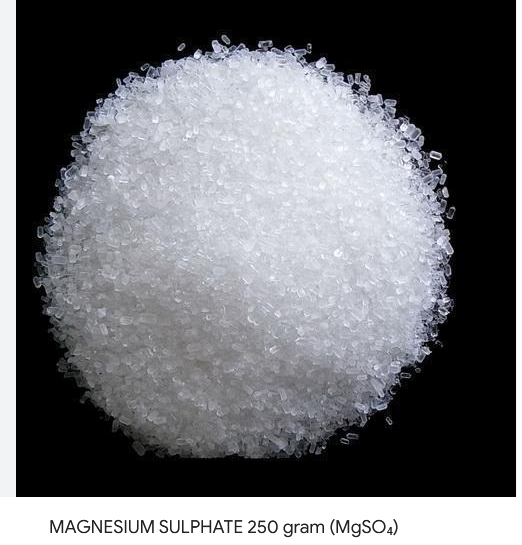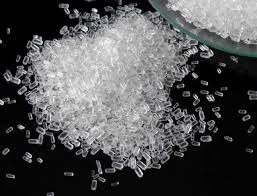Magnesium sulfate is a chemical compound with the formula MgSO₄. It is commonly encountered in the form of heptahydrate sulfate mineral epsomite, commonly known as Epsom salt. The hydrated magnesium sulfate has the chemical formula MgSO₄·7H₂O, indicating that it contains seven water molecules associated with each magnesium sulfate molecule.
Magnesium sulfate has various uses and applications, including:
- Medical Use: It is used in medicine as a component of electrolyte-replenishing solutions and as a medication for conditions such as pre-eclampsia in pregnant women and certain heart arrhythmias.
- Agricultural Use: It is used in agriculture to correct magnesium-deficient soils.
- Fertilizer Additive: It is sometimes used as a fertilizer additive to provide magnesium and sulfur to plants.
- Epsom Salt Baths: It is popularly used in bath salts and bath soaks for relaxation and to soothe sore muscles.
- Industrial Processes: It has applications in various industrial processes, including the production of paper and textiles.
Magnesium Sulfate for Medical Uses
Magnesium sulfate is a source of magnesium, an essential mineral for the human body involved in numerous physiological functions, including muscle and nerve function, blood glucose control, and bone health.
Magnesium sulfate is used for short-term relief of constipation. It is also used as a soaking solution to relieve minor sprains, bruises, muscle aches or discomfort, joint stiffness or soreness, and tired feet. This medicine is a laxative and soaking solution.
This medicine is available without a prescription.
This product is available in the following dosage forms:
- Powder
- Powder for Solution
- Powder for Suspension
- Crystal
- Foam
- Spray
What Should You Know Before You Take Magnesium Sulfate?
Before taking magnesium sulfate, it’s crucial to consider several factors and consult with a healthcare professional. Here are some important points to be aware of:
- Medical Conditions: Inform your healthcare provider about any existing medical conditions, especially kidney problems, heart problems, or myasthenia gravis. People with certain conditions may need special monitoring or dosage adjustments.
- Allergies: If you are allergic to magnesium sulfate or any other medications, make sure to inform your healthcare provider.
- Pregnancy and Breastfeeding: If you are pregnant or breastfeeding, discuss the risks and benefits of using magnesium sulfate with your healthcare provider. In some cases, it may be prescribed during pregnancy to treat specific conditions, but it should only be used under medical supervision.
- Interactions with Medications: Inform your healthcare provider about all the medications you are taking, including prescription drugs, over-the-counter medicines, and herbal supplements. Magnesium sulfate may interact with certain medications.
- Dosage and Administration: Take magnesium sulfate exactly as prescribed by your healthcare provider. Do not self-prescribe or change the dosage without consulting your healthcare professional.
- Monitoring: Regular monitoring of magnesium levels in the blood may be necessary, especially if you are using magnesium sulfate for an extended period.
- Side Effects: Be aware of potential side effects, which may include diarrhea, stomach upset, and, in more severe cases, symptoms of magnesium toxicity such as dizziness, confusion, slow heart rate, or difficulty breathing. Report any unusual or severe side effects to your healthcare provider.
- Emergency Situations: In case of an overdose or if you experience severe side effects, seek medical attention immediately.
How to Take Magnesium Sulfate?
Magnesium sulfate is typically administered under the guidance of a healthcare professional, and the method of administration can vary based on the specific medical condition being treated. Here are common ways magnesium sulfate may be taken:
- Oral Administration:
- For certain medical conditions, magnesium sulfate may be prescribed in oral form. This is usually in the form of a tablet or a solution.
- Follow the dosage instructions provided by your healthcare provider.
- Take the medication with a full glass of water.
- Intravenous (IV) Administration:
- In more severe cases or medical emergencies, magnesium sulfate may be administered intravenously (directly into the veins).
- This is often done in a hospital or clinical setting under the supervision of healthcare professionals.
- The rate of infusion and dosage will be carefully controlled.
- Topical Application (Epsom Salt Baths):
- Magnesium sulfate is commonly used in bath salts, known as Epsom salt baths, for relaxation and muscle soreness.
- Dissolve a specific amount of Epsom salt in warm bathwater as per the product instructions.
- Soak in the bath for the recommended duration.
Regardless of the method of administration, it is essential to follow your healthcare provider’s instructions precisely. Here are some general tips:
- Dosage: Take the prescribed dosage as directed by your healthcare provider. Do not self-prescribe or change the dosage without consulting your doctor.
- Monitoring: Your healthcare provider may monitor your magnesium levels through blood tests, especially if you are on a prolonged course of magnesium sulfate.
- Side Effects: Be aware of potential side effects, and if you experience any unusual or severe symptoms, contact your healthcare provider promptly.
- Emergency Situations: In case of an overdose or if you experience severe side effects, seek medical attention immediately.
Magnesium Sulfate Relaxes Spasms
Perhaps there’s nothing more painful than sudden painful muscle spasms. Well there’s nothing more fast-acting at stopping muscle spasms and twitching than this vital mineral compound. It’s also been shown to reduce aching joint pain by 80%.

Magnesium Sulfate is Used for:
Treating low magnesium levels and maintaining the proper amount of magnesium in the body when used as part of intravenous (IV) feedings (eg, total parenteral nutrition [TPN]). It is also used in pregnant women to control seizures due to certain complications of pregnancy (eg, severe toxemia) and to control high blood pressure, severe brain function problems (encephalopathy), and seizures in children who have sudden, severe inflammation of the kidneys (acute nephritis).
Magnesium sulfate is a mineral. It works by replacing magnesium in patients who have low magnesium levels in the body due to illness or treatment with certain medicines. Magnesium sulfate may also be used to treat seizures by decreasing certain nerve impulses to muscles.
Magnesium sulfate is an inorganic salt (chemical compound) containing magnesium, sulfur and oxygen, with the formula MgSO4. It is often encountered as the heptahydrate sulfate mineral epsomite (MgSO4·7H2O), commonly called Epsom salt, taking its name from a bitter saline spring in Epsom in Surrey, England, where the salt was produced from the springs that arise where the porous chalk of the North Downs meets non-porous London clay. The monohydrate, MgSO4·H2O is found as the mineral kieserite. The overall global annual usage in the mid-1970s of the monohydrate was 2.3 million tons, of which the majority was used in agriculture.
Anhydrous magnesium sulfate is used as a drying agent. The anhydrous form is hygroscopic (readily absorbs water from the air) and is therefore difficult to weigh accurately; the hydrate is often preferred when preparing solutions (for example, in medical preparations). Epsom salt has been traditionally used as a component of bath salts. Epsom salt can also be used as a beauty product. Athletes use it to soothe sore muscles, while gardeners use it to improve crops. It has a variety of other uses: for example, Epsom salt is also effective in the removal of splinters.
It is on the WHO Model List of Essential Medicines, the most important medications needed in a basic health system.
What Are the Side Effects of Magnesium Sulfate ?
Magnesium sulfate, when used appropriately under medical supervision, is generally well-tolerated. However, like any medication, it can cause side effects. Here are some common side effects of magnesium sulfate:
- Gastrointestinal Disturbances:
- Diarrhea is a common side effect of oral magnesium sulfate.
- Nausea and stomach upset may also occur.
- Central Nervous System Effects:
- Excessive use or rapid administration of magnesium sulfate can lead to central nervous system depression.
- Symptoms may include drowsiness, confusion, weakness, and, in severe cases, respiratory depression.
- Muscle Weakness:
- High doses of magnesium sulfate may cause muscle weakness.
- Cardiovascular Effects:
- Abnormalities in heart rate and blood pressure may occur, especially with rapid intravenous administration.
- Injection Site Reactions:
- Pain or irritation at the injection site may occur with intramuscular or intravenous administration.
- Allergic Reactions:
- Allergic reactions to magnesium sulfate are rare but can occur. Seek medical attention if you experience signs of an allergic reaction, such as rash, itching, swelling, severe dizziness, or difficulty breathing.
- Electrolyte Imbalance:
- Prolonged or excessive use of magnesium sulfate can lead to electrolyte imbalances, including hypermagnesemia (elevated magnesium levels), which can have serious consequences.
It’s crucial to use magnesium sulfate under the supervision of a healthcare professional, and the dosage and rate of administration should be carefully monitored to avoid adverse effects. If you experience any unusual or severe symptoms while taking magnesium sulfate, it’s important to contact your healthcare provider promptly.
What Are the Drug Interaction of Magnesium Sulfate ?
Magnesium sulfate can interact with other medications, potentially affecting their absorption, effectiveness, or side effects. It’s important to inform your healthcare provider about all the medications, supplements, and over-the-counter drugs you are taking. Here are some examples of drug interactions with magnesium sulfate:
- Neuromuscular Blocking Agents:
- Magnesium sulfate may enhance the effects of neuromuscular blocking agents, which are drugs used during surgery to relax muscles. This can lead to increased muscle weakness and respiratory depression.
- Calcium Channel Blockers:
- Concurrent use of magnesium sulfate and calcium channel blockers may lead to enhanced neuromuscular blockade and increased risk of respiratory depression.
- Aminoglycoside Antibiotics:
- Magnesium sulfate may enhance the toxic effects of aminoglycoside antibiotics, such as gentamicin and tobramycin, on the inner ear and kidneys.
- Digoxin:
- Magnesium sulfate can enhance the effects of digoxin, a medication used for heart conditions. This can lead to an increased risk of digoxin toxicity.
- Quinidine:
- Concurrent use of magnesium sulfate and quinidine (antiarrhythmic medication) may lead to an increased risk of quinidine toxicity.
- Tetracycline Antibiotics:
- Magnesium-containing antacids or supplements may reduce the absorption of tetracycline antibiotics when taken simultaneously. It is advisable to separate the administration of these drugs.
- Laxatives:
- Magnesium sulfate is a type of laxative and should be used cautiously in combination with other laxatives to avoid excessive diarrhea and potential dehydration.
This is not an exhaustive list, and there may be other drug interactions with magnesium sulfate.
ihb4gv